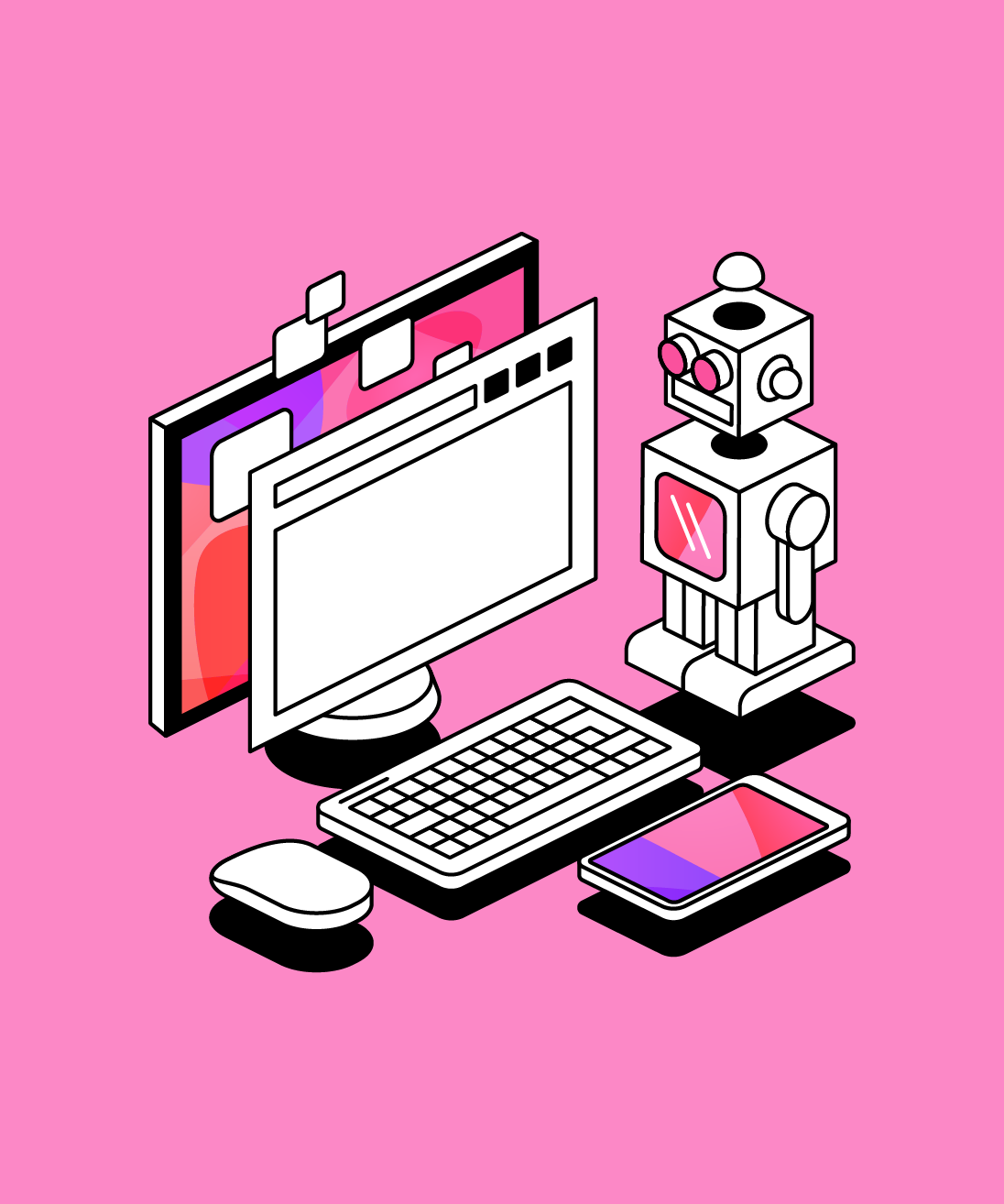Genio AI Hub
All our resources on Artificial Intelligence in one handy place.
At Genio, we believe in being accountable for the impact of our AI, both in the products and services we create for our customers and in our own internal operations. We're committed to the responsible and ethical use of AI, which means we won't develop our own products, or use third party services, in a way that conflicts with our principles.
Please read our pledge and additional resources below to learn more about our company approach to AI.
Genio AI Pledge
At Genio, we think very carefully about how we leverage AI in our products. We are conscious of the threat AI can pose to learning, critical thinking and individuality, but also recognize and aim to harness its potential to positively support these. Genio promotes the responsible use of AI for learning while recognizing our duty to guard against potential harm by working to protect data and intellectual property.
Our pledge to you is that we will always strive for:
Privacy
All data is used strictly for user-specific features such as personalized notes and presentation rehearsal, and is protected by industry-leading encryption and privacy protocols.
Transparency
We prioritize accountability, education, and informed decision making.
We know that the more information we share about our use of AI, the easier it is for you to make an informed decision about using Genio. We do not use any captured data including class content, notes, or personal data to train our AI models.
Productive Learning
We strive to deliver the maximum value and effectiveness through careful, efficient use of technology.
We use AI to remove unproductive friction, such as searching through recordings or transcripts, but retain the “productive friction” that’s integral to learning, like the process of synthesizing notes.
Genio products do not contain Generative AI functionality that allows you to bypass productive friction and generate content.
Genio Products AI FAQs
When we talk about AI capabilities in Genio products and services, we mean:
-
Transcription
-
Live Captions
-
Quiz Me
-
Outline
-
Insights
Yes. We're always going to explore ways in which our software products and services can support the learning process. This exploration includes AI-powered capabilities.
No.
No, we don't allow this. This is agreed contractually with our vendors.
Visit our Third Party Data Processors page for the current list.
By design, most AI capabilities will create new content from the source material, using the prompt provided. Genio's Quiz Me and AI Outline features use transcribed audio as the source material, as well as our own carefully crafted prompts, to generate quiz questions and an "outline" (summary of the content).
🚫We don't allow users to use our AI tools to create their own content outside of these features.
🚫 Users can't modify the prompts used by Genio.
🚫 Users can't generate AI images, video or audio using Genio products. They also can't create long-form text content such as essays.
Our Genio Notes product has the functionality to generate a transcript of recorded audio. This option is available to users once recording has ended. We use third party service providers called AssemblyAI and Deepgram to provide the transcription feature. AssemblyAI and Deepgram will only use the user's audio recording for the purpose of generating a transcript, and nothing more. Once the transcript has been provided to the user, the copy of the audio and the related transcript will be permanently deleted from AssemblyAI / Deepgram's systems.
🚫We don’t allow AssemblyAI or Deepgram (or any of our third party providers) to use end user data to train their own AI models.
Our Genio Notes product has the functionality to generate on-screen captions in real time. Genio uses third party providers called AssemblyAI and Deepgram to provide the Live Captions feature. When an institution purchases Live Captions, the feature is then made available to users in their account.
If a user switches on live captions for an audio recording, a copy of the audio is sent to AssemblyAI or Deepgram who will then process the recording in order to generate the captions. Once the captions have been provided to the user, the copy of the audio recording and the generated captions are permanently deleted from AssemblyAI / Deepgram's systems.
🚫We don't allow AssemblyAI or Deepgram (or any of our third party providers) to use end user data to train their own AI models.
Our Genio Notes product has the functionality to generate multiple-choice questions based on a transcribed audio recording. To provide this capability, we use Microsoft Azure's Open AI service. This means we can benefit from Microsoft's industry leading experience in data privacy and security.
✅Microsoft hosts Open AI’s large language models on Microsoft Azure servers.
🚫The data that we give Microsoft in order to provide the Quiz me feature is NOT:
-
sent to Open AI at any time
-
used to train Open AI’s models
-
used to improve Microsoft services
-
used to improve any third party's product or services.
-
used to improve the Azure Open AI model for other Genio Notes users.
Visit Azure OpenAI Service's data, privacy, and security page to learn more.
Our Genio Notes product has the functionality to generate a simple summary or "outline" based on a transcribed audio recording. To provide this capability, we use Microsoft Azure's Open AI service. This means we can benefit from Microsoft's industry leading experience in data privacy and security.
✅Microsoft hosts Open AI’s large language models on Microsoft Azure servers.
✅Transcripts are sent to Microsoft Azure servers and the AI model output is sent back to the user.
✅Microsoft store prompts and outputs for 30 days to identify patterns of service abuse and then deletes them.
🚫The data that we give Microsoft in order to provide the AI Outline feature is NOT:
-
sent to Open AI at any time
-
used to train Open AI’s models
-
used to improve Microsoft/Azure services
-
used to improve any third party's product or services
-
used to improve the Azure Open AI model for other Genio Notes users.
Visit Azure OpenAI Service's data, privacy, and security page to learn more.
Our Genio Present product uses AI functionality to provide feedback on a user's presentation, and advice to improve, in 4 key areas: Confidence in Delivery, Content Recall, Use of filler words and Pauses, and Story Telling and Engagement. We call this "Insights" - learn more here.
To provide this functionality, we use Microsoft Azure's Open AI service. This means we can benefit from Microsoft's industry leading experience in data privacy and security.
✅Microsoft hosts Open AI’s large language models on Microsoft Azure servers.
🚫The data that we give Microsoft in order to provide the Quiz me feature is NOT:
-
sent to Open AI at any time
-
used to train Open AI’s models
-
used to improve Microsoft services
-
used to improve any third party's product or services.
-
used to improve the Azure Open AI model for other Genio Notes users.
Visit Azure OpenAI Service's data, privacy, and security page to learn more.
Yes, this is a requirement for all vendors that handle personal data on our behalf.
Genio follows the principle that ownership of data doesn't change regardless of it being captured in our platform. So, if the content belongs to the user before it's captured in our platform, it remains theirs. For users who access Genio products and services through their organisation or institution, it's their responsibility to make sure they follow the relevant local laws and their institution's policies when capturing data within Genio. Learn more about this in Section 6 of the Genio End User Service Agreement (EULA).
No, a user has to click a button to initiate any of these AI-powered actions.
Genio AI Security Policy
This policy applies to anyone developing AI systems and functionality for our products and services, and to our internal use of AI tooling (including third-party tools) that process customer data.
-
Read our full AI policy
The table below details how our AI practices align with the SOC 2 Trust Services Criteria, which cover the key areas of security, availability, processing integrity, confidentiality, and privacy.
To learn more about our SOC2 compliance and security practices, head to the Genio Security page.
Criteria
Principle
Objective
Security
Access Control
Protect systems from unauthorized access by implementing role-based access controls, multi-factor authentication (MFA), and regularly reviewing access privileges. This ensures only authorized personnel can access and modify AI systems and data.
Risk Management
Mitigate vulnerabilities in our AI infrastructure by conducting regular risk assessments, vulnerability scans, and penetration testing. We proactively address identified threats and maintain an incident response plan to handle security breaches.
Availability
System Reliability
Ensure high uptime and continuous service by designing AI systems with redundancy, load balancing, and automated failover mechanisms. We monitor system performance and resource utilization to prevent bottlenecks and ensure scalability.
Business Continuity
Maintain a tested disaster recovery plan that outlines procedures for data backup and system restoration to minimize service disruption in case of an outage or disaster.
Processing Integrity
Data & Lifecycle Integrity
Ensure data accuracy throughout the AI lifecycle by implementing data validation checks, clear data lineage, and quality assurance at each stage, from data ingestion to model deployment and retirement.
Performance & Accuracy
Monitor and validate AI system performance against established benchmarks and Key Performance Indicators (KPIs). We document our testing methodologies and regularly audit model outputs to ensure they are complete, accurate, and reliable.
Confidentiality Data Protection
Safeguard confidential data and intellectual property by encrypting data both in transit and at rest. We enforce strict data handling policies for proprietary algorithms, trade secrets, and internal business information.
Secure Processing
Process sensitive data securely by using secure computing environments and anonymizing data where possible. All personnel are bound by confidentiality clauses to protect confidential information.
Privacy
Data Minimization
Collect only necessary Personal Data by limiting data collection to what is essential for the function of the AI system. We also implement procedures for data masking and pseudonymization to reduce privacy risks.
Regulatory Compliance
Adhere to all relevant privacy laws and regulations, including UK GDPR, CCPA, FERPA. We proactively monitor legislative changes to ensure our privacy controls remain compliant and up-to-date.

AI policy template for institutions
Read our blog on ethical approach to AI

AI Principles at Genio
Read our blog post written by one of our Engineering Managers, Natasha, about the important principles we stick to when working with AI.

An AI approach to productive friction and the future of learning
Our Chief Technology Officer, Josh Nesbitt, explores how to find the right balance for an AI driven learning future.

How institutions can integrate using AI in higher education
Delve into the opportunities AI presents for enhancing learning, addressing common fears, and fostering critical thinking skills among students and faculty.